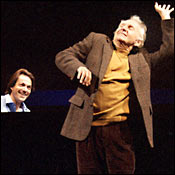
Photo: Carol Rosegg
I have not read Mitch Albom’s Tuesdays With Morrie, but I saw the TV movie with Jack Lemmon, and I caught one of Morrie’s appearances on Nightline. I’ll go out on a limb and declare Jeffrey Hatcher and Mitch Albom’s 90-minute intermissionless stage adaptation the most incisive, affecting, indeed perfect form of this deeply moving story. Surely no one needs to be told that tale, of a beloved Brandeis sociology prof, Morrie Schwartz, and his favorite student, Mitch Albom, who, after sixteen years of neglecting him, came back to Morrie, who was dying of Lou Gehrig’s disease. Visiting him every Tuesday by plane from Detroit to Boston, Albom succored Morrie and recorded his uncommonly brave, wryly stoical, exemplary final months.
But no matter how well you know this story, the play will make it more vivid, more shattering, more humorous for you. For this is no mere docudrama; it is also art (Hatcher is a notable playwright), and art, however unfair that may be, is more real than life to those not immediately concerned. This piece of theater strikes me as indelible, unforgettable – the true memento mori for all of us, and the finest memento of Morrie.
David Esbjornson, who is evolving into a major director, has beautifully orchestrated two incomparable performances. As Morrie, Alvin Epstein achieves the greatness that has hitherto narrowly eluded him. He is masterly in timing and delivery, inflection and silence, movement and stillness. Matching him all the way is the Mitch of Jon Tenney, known as talented and handsome, but now also humanly involving, mellowly comical, and heartbreakingly true.
Robert Brill’s sliding black panels, eliminating all frills, sparely reveal the few evocative necessaries, concentrating on framing the two human figures. And Brian MacDevitt gives us a fully dramatic lighting plot, almost a play within a play, sculpting, intensifying, or wistfully dissolving the two characters. This is a play that might – incredibly, just might – change your life.
To say that David Mamet’s Boston Marriage is inane would almost be flattery. It is preposterous, arrogant, crude, pointless, and numbingly dull. Having thus far been mostly an American-accented Pinter epigone, Mamet now sets out to be a Wilde imitator, though with added meanspiritedness and vulgarity.
What Mamet seems to take for the true revelation of a turn-of-the-century Boston drawing room and its goings-on – unless, without exculpating him, it is intended as pure fantasy – has no bearing on anyone, no relevance to any time or place. We have here Anna, a rich man’s kept woman, in her Day-Glo orange salon, where she is joined by a friend, Claire, and the two have at each other or, together, at the hapless young Scottish maid, Catherine, who keeps bursting into tears for reasons hardly better than being caught in a Mamet play.
There is a feeble excuse for a plot: Claire wants to use Anna’s well-appointed home for a trysting place with a teenage girl she intends to seduce. When the girl (never seen) arrives, there is a surprise first-act ending involving a jeweled necklace given Anna by her protector. This necklace also motivates the would-be amusing shenanigans that take up Act Two, until the meaningless farce comes to an unsurprising ending. The humor, if one may call it that, consists of having Anna and Claire exchanging, in endless one-upmanship, insults whose flowery and stiltedly archaizing language is periodically littered with today’s grossest obscenities. The rest of the time, the ladies nastily mock and humiliate the servant. One hundred minutes of this!
As Anna, Kate Burton is insufferably smug and arch, more mechanical doll than human being. Martha Plimpton at least adds some ballsiness to Claire’s preening and posturing. To Catherine, Arden Myrin brings little more than a specious Scottish accent.
Most of Paul Tazewell’s costumes are, however unintentionally, in execrably gaudy taste; Walt Spangler’s Art Nouveau set seems intentionally absurd. Karen Kohlhaas’s direction plays wholeheartedly into the leaden preciosity of the text and manages to make an already dreadful play even more abominable. We are told that the London production was vastly superior. Well, yes, stylish British actors can make things better, but a silk purse out of this? Never.
Theater Listings
• Openings and Closings
• Broadway Shows
• Off-Broadway Shows
• Off-Off-Broadway
Tuesdays With Morrie
By Jeffrey Hatcher and Mitch Albom, based on Albom’s book.
Boston Marriage
By David Mamet.